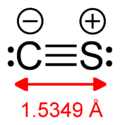Carbon monosulfide
| |||
| Names | |||
|---|---|---|---|
| IUPAC name
carbon monosulfide | |||
| Other names
carbon(II) sulfide | |||
| Identifiers | |||
| 2944-05-0 | |||
| 3D model (Jmol) | Interactive image | ||
| ChemSpider | 97157 | ||
| PubChem | 108054 | ||
| |||
| |||
| Properties | |||
| CS | |||
| Molar mass | 44.07 g·mol−1 | ||
| Appearance | reddish crystalline powder | ||
| insoluble | |||
| Except where otherwise noted, data are given for materials in their standard state (at 25 °C [77 °F], 100 kPa). | |||
| | |||
| Infobox references | |||
Carbon monosulfide is a chemical compound with the formula CS. This diatomic molecule is the sulfur analogue of carbon monoxide, and is unstable as a solid or a liquid, but it has been observed as a gas both in the laboratory and in the interstellar medium.[1] The molecule resembles carbon monoxide with a triple bond between carbon and sulfur. The molecule is not intrinsically unstable, but it tends to polymerize. This tendency reflects the greater stability of C-S single bonds.
Polymers with the formula (CS)n have been reported.[2] Also, CS has been observed as a ligand in certain transition metal complexes.
References
- ↑ Wilson, R. W.; Penzias, A. A.; Wannier, P. G.; Linke, R. A. (1976). "Isotopic abundances in interstellar carbon monosulfide" (pdf). Astrophysical Journal. 204 (pt 2): L135–L137. Bibcode:1976ApJ...204L.135W. doi:10.1086/182072.
- ↑ Chou, J.-H.; Rauchfuss, T. B. (1997). "Solvatothermal Routes to Poly(Carbon Monosulfide)s Using Kinetically Stabilized Precursors" (pdf). Journal of the American Chemical Society. 119 (19): 4537–4538. doi:10.1021/ja970042w.
This article is issued from Wikipedia - version of the 5/28/2016. The text is available under the Creative Commons Attribution/Share Alike but additional terms may apply for the media files.


